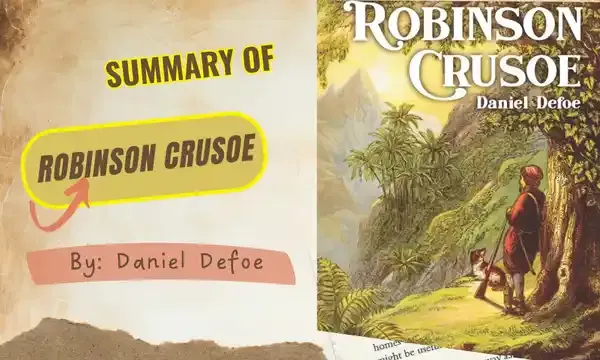The main theme of "Robinson Crusoe" revolves around the exploration of human resilience, survival, and adaptability in the face of extreme isolation and adversity.
 |
| Summary of Robinson Crusoe by Daniel Defoe |
The general idea of Robinson Crusoe
- Survival Instinct: The novel emphasizes Crusoe's resourcefulness and determination to survive on a deserted island through innovation and hard work.
- Spiritual Transformation: Crusoe's isolation leads to introspection and a spiritual awakening as he reflects on his past choices and finds solace in religion.
- Cultural Superiority: Crusoe's colonization mindset is evident through his attempts to "civilize" the island and his native names "Friday," reflecting the colonial attitudes of the time.
Robinson Crusoe chapters
- Chapter 1-4: Establishing the Background
Crusoe's early life, his defiance of his father's wishes to become a sailor, and his eventual shipwreck.
- Chapter 5-13: Survival on the Island
Crusoe's struggle for survival, his building of shelter, obtaining food, and gradual acclimatization to the island.
- Chapter 14-24: Crusoe's Solitude and Discovery
Crusoe's encounters with cannibals, his rescue of Friday, and the establishment of their companionship.
- Chapter 25-28: Return to Civilization
Crusoe's eventual escape from the island, his wealth accumulation in Brazil, and his return to Europe.
Robinson Crusoe novel conclusions
- Human adaptability and ingenuity enable survival in extreme circumstances.
- Isolation leads to self-discovery, spiritual growth, and reassessment of values.
- Cultural biases and colonial attitudes are evident in Crusoe's interactions.
About the author of Robinson Crusoe
Daniel Defoe (1660-1731) was an English writer, journalist, and pamphleteer, known for his expertise in exploring social and moral issues through fiction.
Robinson Crusoe novel compared to other novels
"Robinson Crusoe" is often compared to Jonathan Swift's "Gulliver's Travels" for its exploration of human nature, colonialism, and societal norms.
Robinson Crusoe novel audience
The book appeals to readers interested in adventure, exploration, survival narratives, and philosophical contemplation of human nature.
Reception and critical response
Published in 1719 by W. Taylor, "Robinson Crusoe" received both acclaim and criticism for its realistic portrayal of survival and its reflection of colonial values.
Recommendations
- "Gulliver's Travels" by Jonathan Swift: For a similar exploration of societal issues through adventure.
- "Lord of the Flies" by William Golding: For another perspective on survival and human behavior in extreme circumstances.
The biggest takeaway from "Robinson Crusoe" is the resilience of the human spirit, as demonstrated through the protagonist's ability to adapt, survive, and find meaning in solitude and adversity.
